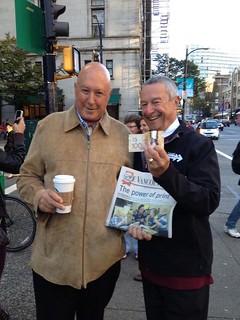One year ago, on Sept. 27, 2012, the world of John Furlong was turned upside down and Vancouverites who followed his rise were shocked.
The Georgia Straight published an expose by Ontario journalist Laura Robinson that revealed Irish-born Furlong lived in Canada before his oft-stated 1974 arrival in Edmonton. He had been a Catholic missionary volunteering as a physical education teacher of aboriginal children at the Immaculata Catholic elementary school in Burns Lake in 1969 and 1970, before moving to Prince George. Some of those ex-students claimed that he abused them and ruined their childhood.
Never before -- and, perhaps, never again -- will British Columbia be so united as it was during February 2010 and Furlong was at the centre of it all. He also became a lightning rod for criticism, whether it was VANOC’s secrecy, its adverse impact on some communities and the environment, the cost of it all, VANOC's finances amid the Great Recession and the preventable death of Georgian luger Nodar Kumaritashvili.
Within hours of the Georgia Straight story hitting the streets and the web, Furlong appeared at a news conference in The Landing in Gastown. A building of significance, for that is where the Bid Corporation and Organizing Committee were once located and it is now home of the Furlong-chaired Vancouver Whitecaps and the TwentyTen Group, the marketing company that represents him. He took no questions, but adamantly proclaimed his innocence. The message he wanted to deliver was plain and simple: the acts that he was accused of committing "just didn't happen."
He did, however, admit to being in Northern British Columbia from 1969 to 1972, facts that were omitted from the book because he felt that period of his life was “fairly brief and fairly uneventful.” A look inside the Prince George newspaper archives, however, says otherwise. A front page story in 1972 said he fled Canada because of repeated attacks and threats while volunteering as a soccer referee.
Furlong sued for defamation on Nov. 27. Less than two months later, the Georgia Straight and Laura Robinson responded with defence statements. They emphatically stand behind their work and plead the truth. They also filed expanded allegations; Robinson’s filing included allegations of sexual assault of a former common law spouse. TwentyTen Group issued Furlong's denial, then silence from the Furlong camp through February and March. He had gone to Ireland with his third wife, Deborah Sharp.
Then tragedy struck. Sharp died in Dublin April 11 after a head-on car crash near their home in rural Gorey, County Wexford. Police in Ireland continue to investigate.
He re-emerged in July as an advisor to a penny-stock gold mining company with ambitions for a motherlode in Albania. Then more trouble. Two women who claimed in July 24 B.C. Supreme Court lawsuits that Furlong verbally, physically and sexually abused them in 1969 and 1970 when they were his students. That action preceded Furlong’s long-awaited rebuttal to the Georgia Straight and Robinson. Furlong repeated his denial and an allegation that Robinson carries a personal vendetta against him. Robinson, who is raising funds for a mounting legal bill, denies that charge. The rebuttal even said Furlong's lawyer had been advised by the RCMP that there would be no criminal charges because the police found no evidence of abuse. (An RCMP spokesman publicly said the investigation was ongoing.)
Jason Gratl, the lawyer for the two new complainants, wrote an open letter to the Commission for Public Complaints Against the RCMP, claiming the RCMP had not done its job and were showing pro-Furlong bias. Gratl pointed out that the Mounties had a $900 million budget to secure the Olympics and senior officials worked closely with Furlong. Gratl is waiting for action from the RCMP complaints watchdog.
The same day Furlong responded in court with denials to Gratl’s clients in September, a third lawsuit was filed by a male ex-student alleging Furlong had sexually assaulted him.
Yet again, you heard or read the important phrase: none of the allegations has been proven in court.
Furlong's public speaking engagements, for which he has charged $20,000 an appearance, evaporated. He did, however, retain support from Own the Podium, Whitecaps FC, Rocky Mountaineer, Whistler Blackcomb and Canadian Tire to remain on their boards. While ex-Premier Gordon Campbell stayed silent, VANOC chairman Rusty Goepel didn't. On the third anniversary of the Games, Goepel wrote a Vancouver Sun commentary in support of Furlong.
A year has passed since the Georgia Straight story. So what next? When will the time come for the to-and-fro of accusations and denials to end? When will evidence be tested and the truth determined? When will a trial happen?
The B.C. Supreme Court registry and lawyer for the Georgia Straight, Roger McConchie confirm there are no hearings scheduled. (Furlong’s lawyer, John Hunter, and his agent, Andrea Shaw of TwentyTen Group, have not responded for comment.)
Said McConchie: “There's been no discovery of any sort, documentary or examination. No examinations for discovery have been scheduled. We haven't had any communication from them on a trial date.
“It's not proceeding on a vigorous pace.”
